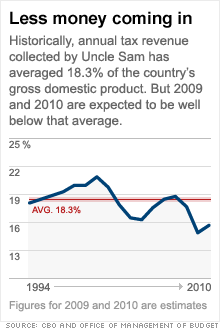The great tax drought of 2009
One reason this year's deficit will set records? A big drop in revenue. Next year probably won't be much better, especially if Congress extends more tax breaks.

NEW YORK (CNNMoney.com) -- You don't need a Ph.D in economics to know that the government fiscal year that ended last week was ugly for the budget.
Much attention has been paid this year to the record-high spending and deficit accrued because of the financial and economic crisis.
But one of the driving factors that has gotten less notice: plummeting tax revenue. The crisis, after all, walloped company profits and savaged Americans' income stream.
Through the end of August, Uncle Sam collected 25% less in tax revenue for the year than he did during the same period a year earlier. The two biggest culprits -- a 56% drop in corporate income tax revenue and a 20% drop in individual income tax revenue.
On balance, the Congressional Budget Office expects that tax receipts will be 14.9% of gross domestic product this year, well below the historical 18.3%average.
While revenue forecasts for next year are better, the CBO estimates tax receipts will only make up about 15.7% of GDP.
But two factors could lower that estimate. The first is whether or not the projections for economic growth and the unemployment rate prove too optimistic. If they do, that would reduce how much tax revenue Washington collects.
The other factor is whether or not lawmakers pass a host of tax-break extensions that are under discussion. Some of those breaks are safety-net provisions that were part of the economic recovery act passed in February, while others come from a bevy of provisions that typically get extended every year.
Possible contenders for extension that could further reduce revenue include:
- the tax credit to help laid-off workers buy health insurance under Cobra;
- the federal income tax exemption for the first $2,400 in unemployment benefits;
- relief from the Alternative Minimum Tax for 2010, which could affect revenue collection for both 2010 and 2011;
- the first-time home buyer credit of $8,000, which expires Nov. 30; and
- the research and development credit for businesses.
The cost of such tax extenders would depend on how they're structured.
But their cost might be offset somewhat by other tax measures. For instance, lawmakers are expected to retain the estate tax for 2010, said Dan Clifton, the head of policy research at Strategas Research Partners.
On the other hand, should lawmakers cook up any new tax breaks during 2010 in the name of stimulus or job creation or any other issue, that could further compromise revenue collections, unless lawmakers stick to their promise to pay for any new tax cuts.
After the financial and economic crises hit in earnest, even many experts who normally lose sleep over deficits said it was no time to be consumed with deficit worries. The economy was on the brink.
It's no surprise to Robert Bixby, executive director of the Concord Coalition, that the projections for tax revenue in fiscal year 2010 are fairly anemic.
"I think 2010 is already baked into the cake as a bad year," Bixby said. "Part of the recovery will be continued high deficit spending because the economy will continue to need stimulus."
But what he hopes to see in 2010 is at least a move toward revenue growth that picks up steam in subsequent years.
Based on current estimates, however, he's not optimistic that will happen unless lawmakers take action.
Right now, "the deficits projected in the president's budget are unacceptably high," Bixby said.
The White House Office of Management and Budget, in its mid-session review this summer, estimated that annual deficits over the next 10 years will range from a high of 11.2% of GDP this year to a low of 3.7% by 2018. Come 2019, however, the OMB estimates the annual deficit will move north again to 4%.
"It's important that there be a deficit reduction plan in Obama's 2011 budget," Bixby added.
He noted that having a plan doesn't necessarily mean having to enact it right away if economic conditions aren't right. But, he said, "We're going to have to face tax increases eventually." ![]()

